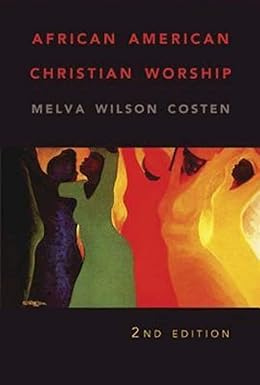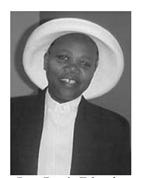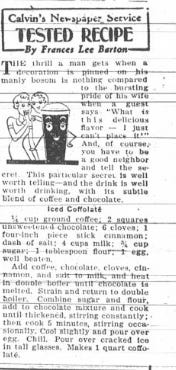FireFall Vol. 19: Honoring the Leadership of Black Women
Watch Dr. Melva Costen; Preacher Nimes, Preacher Ella E. Whitfield, Rev. Mrs. V.R. Robinson, & Leila Holmes; "The Lioness" Rev. Bessie Tshambe; "Community: Rare & Lovely"; Rev. Phumzile Phago
Welcome to FireFall! Thanks for your understanding this week as Wednesday is the new Monday - life circumstances combined with a historical tangle to delay this week’s newsletter. I’m thankful for the opportunity to share the weekly newsletter now. Please keep me in your prayers.
As you know, all February we’ve been celebrating the vocation and leadership of Black women. Black History Month is celebrated in the U.S., Canada, and Great Britain. The Jude 3 Project has shared a great post on early church north African martyrs St. Perpetua and St. Felicity, celebrating the ways that Black history is church history. This Black History Month, we’ve celebrated African American women, as well as women of the African diaspora beyond America, as well as African women. Visit FireFall archives for more by and about Black women leading in ministry.
Watch: Dr. Melva Costen’s Oral History Interview
In 2008, Dr. Melva Costen (1933-2023) sat down for an oral history interview as part of a women in theology and ministry project within the PCUSA.
The video and accompanying transcript can be viewed here. Dr. Costen’s personal and professional experiences were wide-ranging and compelling.
She commented, “My ministry has been shaped by my life experiences and by being married to a clergyman. In turn, that ministry also shaped me, because I was excited about what we were doing.”
“My love still was music in the church - music as a source of healing, music as a healing agent, music as a way to broaden perspectives.”
In the interview, Dr. Costen discussed a range of topics including music, writing drama, Geechee and Gullah people, liturgical dance, the challenges of leading the Presbyterian hymnal committee, the touching, surprising presence of her minister husband’s pool hall friends who showed up to protect her home when her family faced dangerous threats from violent White supremacists, her work in the American Civil Rights movement, the challenges of raising children in the midst of threats of violence, preparing and teaching students how to respond nonviolently in the face of provocation, and much more.
Dr. Costen grew up in the American south, where her Presbyterian congregation belonged to the northern Presbyterian body. After 1983, when the northern and southern Presbyterian branches joined, Dr. Costen joined what became the Presbyterian Hymnal Committee and was asked to chair it.
Dr. Costen wrote the first and second editions of African American Christian Worship as well as In Spirit and In Truth: The Music of African American Worship. For years, Dr. Costen taught on the faculty at the Interdenominational Theological Center in Atlanta, becoming the Helmar Emil Nielsen Professor of Worship and Music and chair of the church music degree program. Later, she was named Visiting Professor of Liturgical Studies at the Yale Institute of Sacred Music.
Dr. Costen passed away in the fall of 2023. The celebration of her life was held at Central Presbyterian Church in Atlanta. The Presbyterian Historical Society archives hold the papers of James and Melva Costen; the digitized portion of the Costen archives can be accessed here.
Watch Dr. Costen’s oral history interview here.
Finding History: Preacher Nimes, Preacher Ella E. Whitfield, Rev. Mrs. V.R. Robinson, and the Problem of Preacher Leila Holmes
I’m thankful for the ways we find to tell our stories. One of my grandmothers was a fantastic storyteller; she didn’t have many family keepsakes and few of any monetary value, but she could keep you spellbound, though she never would’ve used the phrase “oral history.”
Maybe in archives or attics, an elder’s memory and stories or church conference records, there’s more to learn about Preacher Nimes, pictured below. At the moment, I’ve found a named photo with location, and the collection to which it belongs.
So far, I haven’t found more information on Preacher Nimes, though African American women evangelists, pastors, and traveling preachers weren’t uncommon in the early 1900s, from more familiar names like Rev. Emma Cotton in California to Mother Mary Magdalena Lewis Tate who founded The Church of the Living God in Alabama. (The Flower Pentecostal Heritage Center holds a collection of Mother Tate’s letters and manuscripts.)
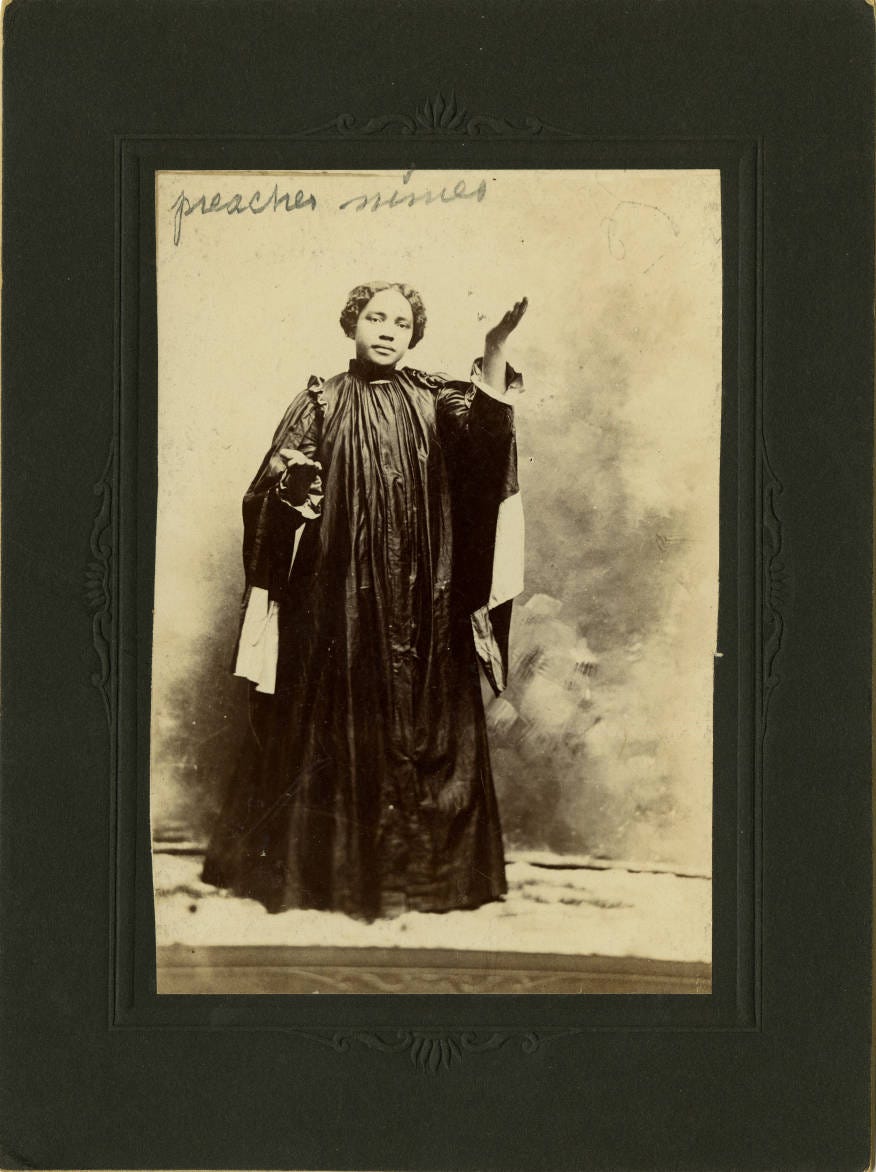
Do you know anything about Preacher Nimes of Kentucky? I’m thankful we have this photo, even if there’s little else about her.
Over at the Library of Congress, there’s a photo of African American Preacher Ella E. Whitfield (partially available digitally, full availability only through LOC). Thankfully, we do know something of Preacher Whitfield via Dr. Bettye Collier-Thomas, as Dr. Beth Allison Barr shares here: Preacher Whitfield was an early 1900’s Texas Baptist who preached nearly 500 sermons.
(I have mixed feelings about books I consider to be fairly recent being digitized “open access”/free and available online; some scholars I know are surprised to find their own works on archive.org, for instance. For books that are out of print - regardless of whether or not I think they should be out of print - I’m thankful for their broad availability through digitized open access projects, and I’m very supportive of initiatives that remove hurdles for those without access to academic libraries. At the same time, I’m concerned about authors’ scholarship and hard work being in print for a limited time and then freely shared: scholars make very, very little money from academic publishing as it is (maybe you’ve seen those social media images of royalty checks for a few dollars). I’ve seen some books digitized and made available online that were published as recently as 2013. So: I’m thankful for broad access, and, I’m concerned about how we can better honor and compensate scholarly research and publishing.)
That’s a long way of saying Dr. Bettye Collier-Thomas’ Daughters of Thunder: Black Women Preachers and Their Sermons, 1850-1979 is available to read open-access online here for more on Preacher Ella E. Whitfield and other African American women.
Thanks to the hard-working archivists stewarding the C.M. McClung Historical Collection at the Knox County Public Library, we also have access to this image of a Rev. Mrs. V.R. Robinson, evangelist from Newport Tennessee sometime around the early 1900’s. Use permissions are unclear, so I’ll happily remove the attributed image shared below if requested.
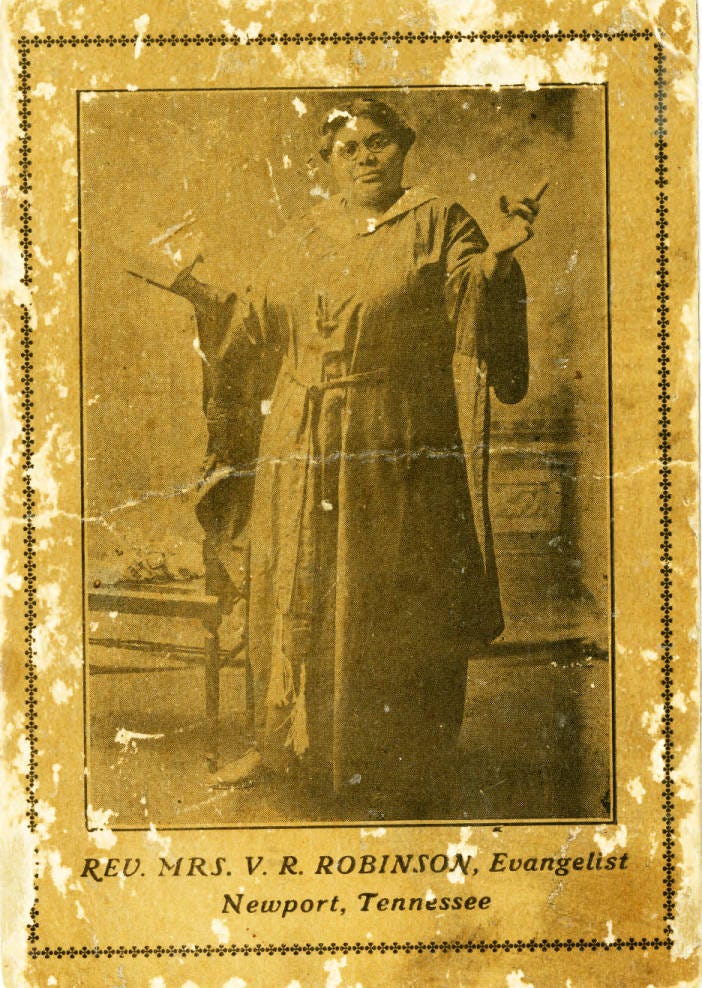
Similarly to Preacher Nimes, if you’ve bumped into other information about Rev. Mrs. V.R. Robinson, please share it.
While so far I’ve uncovered little information on Preacher Nimes other than the photo, there’s a different historical challenge regarding not a photo but a 1930’s interview with Negro holiness preacher Leila Holmes, which I originally intended to reference and excerpt here, since information on both Preacher Nimes and Preacher Holmes is so limited.
But the Preacher Holmes challenge became such a tangle I could spend the rest of this post laying it out - and I want to use that space to celebrate the known of women church leaders, pastors, and scholars in Black history and today.
So I’m moving the case of Preacher Leila Holmes into her own post, because it’s very important, and it’s also more involved than we have space for here.
The Lioness: Rev. Bessie Tshambe (Tsambe/Chambo), Remarkable Nazarene Pastor of Mozambique
According to the Dictionary of African Christian Biography, Rev. Bessie Tshambe (or Tsambe/Chambo) “was ordained in 1991 by General Superintendent Jerald D. Johnson, the first woman to be ordained by the Church of the Nazarene in Mozambique.”
In the introduction to the compilation Faithful to the Call: Women in Ministry, Rev. Dr. Carla Sunberg writes, “This woman, Rev. Bessie Luisa Timoteo Mucavele Chambo (or Tsambe), is known as the ‘Lioness of Africa’ because, from the moment she knew she was to be a minister, she never allowed circumstance to get in the way of obedience. Eventually she pastored the Maputo Central Church of the Nazarene in Mozambique. Under her leadership, the church grew to nearly three thousand members and planted more than twenty new congregations. She was also a wife who partnered in her husband’s ministry and invested in her children. Today one of her sons, Dr. Filimão Chambo, serves as a general superintendent in the Church of the Nazarene.” (Dr. Sunberg explains, “The family name in their native language is Tsambe, or Ntsembe, but it was changed to Chambo by the colonial Portuguese leadership of Mozambique” - a helpful clarification of possible spellings to search if you’re exploring records.)
Dr. Sunberg continues, “On the night of November 6, 1966, during family prayer, her father read a passage that spoke of a divine calling. Her dad preached, they prayed together, and then the family went to bed. Bessie couldn’t sleep, so she went outside to pray. Her intention was to study hard and make money to help her parents—never to marry a pastor, or the son of a pastor, much less become one herself! All she knew was that the pastors around her were poor, without much chance of economic improvement. But that night, she responded yes to the divine call, thanks to the prayers of her parents and the believers around the world who prayed that God would call more workers into the great harvest.”
After a period of teaching, pursuing further training, raising children, and supporting her husband’s ministerial activities, Rev. Tshambe began pastoring a congregation that had been left without a pastor. She was ordained and went on to pastor Maputo Central Church from 1991-2013.
Dr. Sunberg notes, “Bessie would tell us that we are to ‘influence believers in a positive way, entrust them with tasks to encourage them to discover their spiritual gifts, and train workers for the advancement of the work of God. Never try to do everything alone!’ Finally, [Bessie] advises women who are called to ‘have attentive ears to listen and eyes fixed on the One who calls. He will never leave you.’”
Born in 1945, Rev. Tshambe was still sharing encouragement and insights as recently as a 2022 Zoom call.
Read more about Rev. Tshambe in the downloadable PDF sample of Faithful to the Call here or at the DACB here.
Community: Rare and Lovely - Audio of Rev. Dr. Prathia Hall’s 1989 Sermon
Sometimes audio or video files can be embedded directly in a post, other times they can’t. I’d love to embed this audio file and make it hard to scroll past, but don’t miss the opportunity to visit this archival page at Princeton Theological Seminary that contains the audio for “Community: Rare and Lovely,” a sermon Rev. Dr. Prathia Hall preached in 1989. Listen by tapping the loudspeaker image or scrolling to the bottom of the page and clicking the triangle “play” button of the player bar.
For more audio files of sermons and lectures by Dr. Prathia Hall, visit this page.
Every time I try to write something about this sermon, my words immediately seem flimsy and inadequate or worse. So I’ll simply say, I’ve heard thousands of sermons in my life, and I immediately wanted to re-start it and listen again.
“Do Not Despise Small Beginnings”: Rev. Phumzile Phago Speaks to Women in Ministry
Rev. Phumzile Phago, an ordained minister in the Church of the Nazarene in South Africa, contributed a chapter to Faithful to the Call mentioned above. In 2012, Rev. Phago planted a church in Pretoria; before that, she ministered at churches in Zebediela (Limpopo), Pretoria, and Soweto. She has preached and taught in places like the United States, Kenya, the United Kingdom, Eswatini, and Lesotho.
Receive her encouragement in this under-fifteen minute video:
For Fun: Sometimes in the Archives, You Bump into Recipes
The other day, hip-deep in a frustrating (okay I was really angry) historical tangle, I was checking digitized newspaper archives. I’m thankful some historic African American newspapers are available online alongside archives of 20th century White newspapers, especially from southern states in the U.S.
An ad caught my eye: this was in a 1938 issue of the Palmetto Leader, a Black newspaper published in South Carolina.
(“Frances Lee Barton” was like a pen name for spokeswomen/radio personalities who ostensibly developed recipes for a food company, similar to “Betty Crocker,” - this is a recipe-ad placed by a nationwide brand, not an individual.)
This looks…amazing. I’m going to try it sometime soon, but not so that my husband’s manly bosom bursts with pride when a guest raves over a wifely recipe.
Iced Coffolate
1/4? cup ground coffee
2 squares unsweetened baking chocolate
6 cloves
1 four-inch piece cinnamon stick
Dash of salt
4 cups milk
3/4 cup sugar
1 T. flour
1 egg, well beaten
(This is obviously from the 30’s, rationing in the 40’s would wipe out this recipe.)
Add coffee, chocolate, cloves, cinnamon, and salt to milk, and heat in double boiler until chocolate is melted. Strain and return to double boiler.
Combine sugar and flour, add to chocolate mixture and cook until thickened, stirring constantly.
Then cook 5 minutes, stirring occasionally.
Cool slightly then pour over egg. (Hmm…hopefully it’s hot enough that well-beaten egg is cooked without getting scrambled? Not sure about this egg bit.)
Chill; serve over ice in tall glasses.
Thank you for subscribing to FireFall and sharing these resources by, for, and about women in church leadership and theological education. When you click these links, share these resources, and watch or listen to these audio and video files, you are amplifying the voices of women and elevating their vocations.
FireFall is an ecumenical free weekly newsletter. Resources are curated by Elizabeth Glass Turner. Thanks to the generosity and skills of volunteer Pastora Daniela Galindo-Cabrieles, FireFall resources are being translated into Spanish as Fuego Descendió.
Thank you so much to all subscribers who are able to upgrade to paid subscriptions. FireFall is not financially sponsored or supported by denominational or academic entities; it’s a labor of love, and your support is appreciated.





